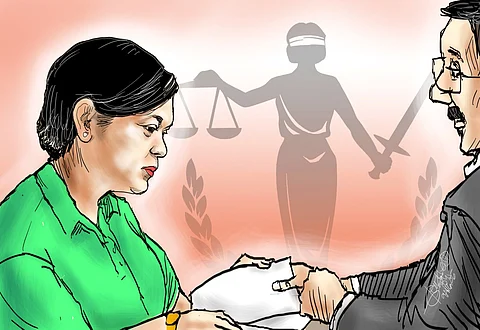
- NEWS
- the EDIT
- COMMENTARY
- BUSINESS
- LIFE
- SHOW
- ACTION
- GLOBAL GOALS
- SNAPS
- DYARYO TIRADA
- MORE

We have a national allergy to rules — the kind that say: this is how you keep the republic from turning into a free-for-all. Our civic instinct is to skip to the ending, especially if the ending promises the public humiliation of someone we dislike.
The Supreme Court (SC), in its unglamorous sobriety, has just reminded us that you don’t preserve democracy by trampling on its procedures in the name of saving it.
The impeachment of Vice President Sara Duterte, where the SC ruled 13-0 with one abstention and one justice on leave, is bound by the Constitution’s one-year bar. This has been in the news for days now, but belabor the Court’s rationale we must — amid the noise being made by those who want to vilify the justices and the ruling.
According to the SC, the first three endorsed complaints against Duterte, filed in December 2024, died a bureaucratic death in early February 2025. That started the clock, it explained, adding that 6 February 2026 would be the earliest the next complaint can be filed.
Since this is a nation predisposed to dramatics, cue the groans. But first, a reminder: the justices didn’t say the charges — ranging from corruption to alleged assassination plots — were baseless. They simply said: right case, wrong time, wrong method.
You can’t bypass the speed bumps the Constitution put there just because you’ve decided the other car deserves to be totaled, the SC order said in so many words.
Justice Marvic Leonen’s opinion reads like a lecture from that one professor who insists on footnotes: The end does not justify the means. We’ve heard the line before, but here it’s not a sermon — it’s jurisprudence.
Ignore the one-year rule today, and you’ve handed tomorrow’s scoundrel a ready-made loophole. Due process, the Court said, isn’t suspended just because the accused holds high office and is ripe for the picking.
The Vice President, like any citizen, is entitled to see the evidence, answer the charges, and have the House deliberate before sending the case to the Senate.
The Constitution’s deadlines and timelines aren’t quaint afterthoughts; they are obligations. And “session days” are not calendar days — yes, the Court even had to spell that out.
Still, in the wake of the SC’s ruling, the Senate — with 19 senators voting against five — wasted no time in archiving the impeachment complaint. Case closed, at least in their chamber.
The House, unwilling to let the matter rest, had since filed a motion for reconsideration before the Court, seeking to reopen the door the justices had just firmly shut. But that motion by the House, too, is part of due process which, all should note, is being given due course by the SC.
We like to think of impeachment as the people’s thunderbolt. In truth, it’s a plodding legal ritual dressed in political robes. Skip the rituals and you don’t get lightning; you get an electrical fire that burns the whole house down.
Some will accuse the Court — and now the Senate — of hiding behind technicalities. But “technicality” is what you call a rule you don’t like at the moment. The same rule, when it shields your allies, becomes “the sacred Constitution.” That’s the problem with double standards: they work twice as fast against you.
The decision doesn’t slam the door on accountability; it just locks it until February 2026. If the case is strong, it will survive the wait. If it isn’t, the delay spares us a spectacle masquerading as justice.
The Court, in a rare unanimous voice, just put up a “No Shortcut” sign. It’s not romantic. Certainly, it’s not cathartic. But it’s the sort of discipline that keeps tomorrow’s opposition from being crushed under the same improvised rules you cheered for today.
